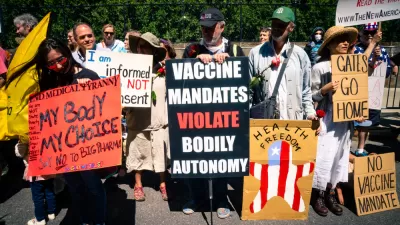The Biden administration's efforts to curb the tendency of highway expansions to cut into Black communities will be tested by the West I-526 Lowcountry Corridor plan in North Charleston, South Carolina.
The West I-526 Lowcountry Corridor is moving forward with plans to expand the roadway in South Carolina, seizing property in surrounding Black communities along the way.
"South Carolina is proposing to sweep aside dozens of homes, and potentially hundreds of people, to widen a freeway interchange choked with traffic in this booming coastal region," report Darryl Fears and John Muyskens. "The $3 billion project is expected to begin about two years after the plan becomes final."
Fears and Muyskens note that the West I-526 Lowcountry Corridor is moving forward despite vows by President Joe Biden and Transportation Secretary Pete Buttigieg to undo the racist legacy of U.S. transportation infrastructure.
The West I-526 Lowcountry Corridor plan won't be the final highway expansion pursued at the expense of existing Black communities either.
If Charleston County has its way, the roadbuilding and housing destruction would not stop in North Charleston. In late August, officials unveiled a separate, $720 million plan for an expressway to begin near the expanded beltway and extend south to rural Johns Island and suburban James Island. Both places contain historic African American enclaves, where formerly enslaved people spread out from a nearby plantation in the 1870s.
The feature article includes interactive maps and graphics, as well as additional details about the history, politics, and consequences of transportation planning in the state and region.
FULL STORY: Black people are about to be swept aside for a South Carolina freeway — again

Planetizen Federal Action Tracker
A weekly monitor of how Trump’s orders and actions are impacting planners and planning in America.

Chicago’s Ghost Rails
Just beneath the surface of the modern city lie the remnants of its expansive early 20th-century streetcar system.

San Antonio and Austin are Fusing Into one Massive Megaregion
The region spanning the two central Texas cities is growing fast, posing challenges for local infrastructure and water supplies.

Since Zion's Shuttles Went Electric “The Smog is Gone”
Visitors to Zion National Park can enjoy the canyon via the nation’s first fully electric park shuttle system.

Trump Distributing DOT Safety Funds at 1/10 Rate of Biden
Funds for Safe Streets and other transportation safety and equity programs are being held up by administrative reviews and conflicts with the Trump administration’s priorities.

German Cities Subsidize Taxis for Women Amid Wave of Violence
Free or low-cost taxi rides can help women navigate cities more safely, but critics say the programs don't address the root causes of violence against women.
Urban Design for Planners 1: Software Tools
This six-course series explores essential urban design concepts using open source software and equips planners with the tools they need to participate fully in the urban design process.
Planning for Universal Design
Learn the tools for implementing Universal Design in planning regulations.
planning NEXT
Appalachian Highlands Housing Partners
Mpact (founded as Rail~Volution)
City of Camden Redevelopment Agency
City of Astoria
City of Portland
City of Laramie





























